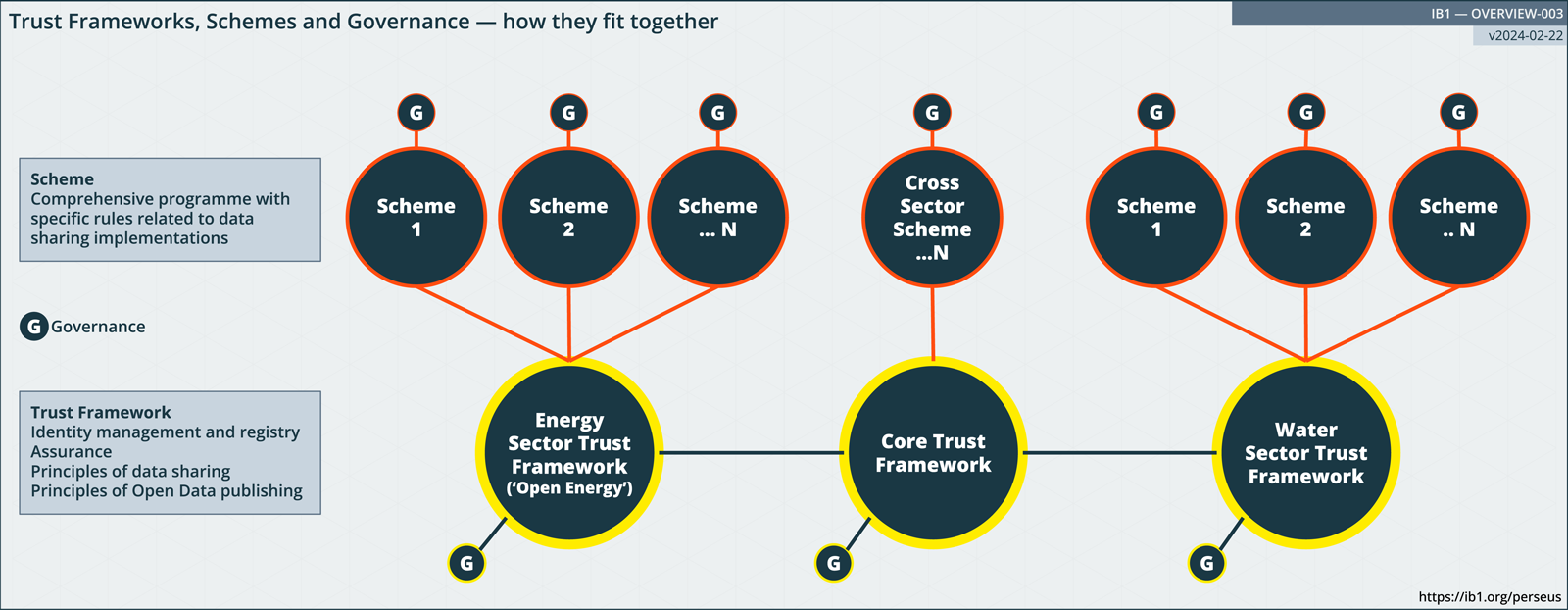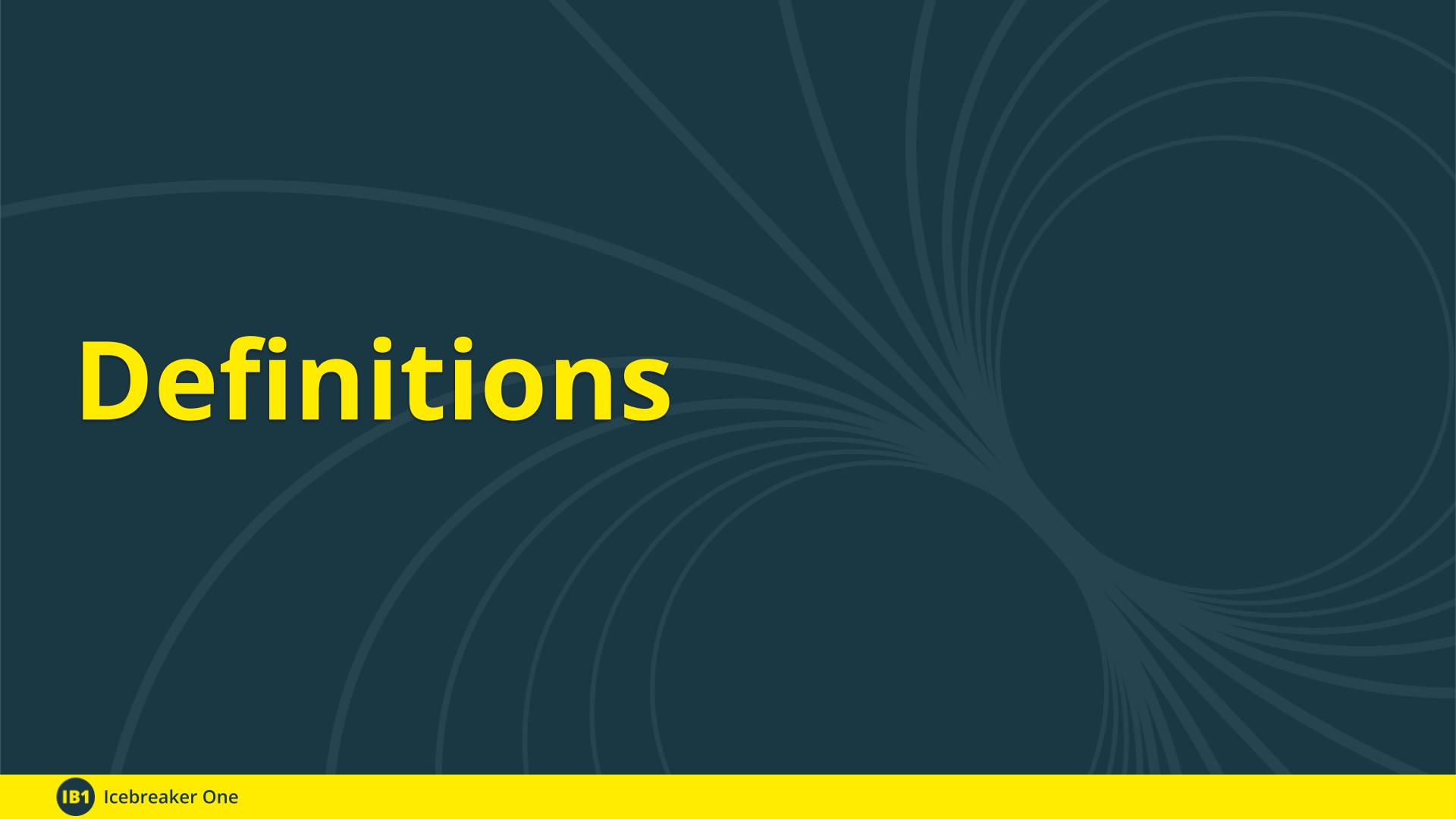V2026-01-30
Schemes are the rulebooks that detail how organisations must govern the sharing of data.
Schemes define what can be shared, why, by whom, how, and what protections exist. They can be mandatory (regulated) or voluntary (industry-led and adopted).
Example
For example, if you wanted to share electricity smart meter data with an app that helped reduce your energy bills, there are many different companies involved. As the one sharing that data you want to know it’s being handled properly, and that it won’t be misused. The benefit for the companies involved is that by having common rules, and ways of enforcing them, is that their risks are reduced. It can also help government and regulators influence, or regulate, rules that are needed to ensure markets are fair and open, unlock innovation and enable protections.
How IB1 helps support Scheme development
IB1 facilitates the co-design of Schemes using a robust, multi-stakeholder governance process (Icebreaking).
Trust Frameworks and related Trust Services help apply the rules in a way that both humans and machines can understand. They enable monitoring, reporting and verification of those using the rules. This helps make sure the rules are being followed and offers ways to help enforce the rules when needed.

A Scheme within the context of Trust Frameworks at Icebreaker One (IB1) refers to a multilateral contract which has been co-designed by market participants through a structured program.
Market participants can span sectors, including but not limited to, finance, energy, water, transport, agriculture, and the built environment. A Scheme typically encompasses:
- Purpose and Objectives: A Scheme is created with specific goals in mind, often to address a particular challenge or opportunity within a sector or across sectors. For example, facilitating the transition to net zero, improving water management, or enhancing financial transparency. Purpose could be linked to a specific use case (e.g. Perseus) or to a general purpose data need (e.g. Open Data Scheme)
- Participants: Schemes involve a range of participants, including private and public sector organisations, and organisations that represent the interests of consumers, citizens and industry (e.g. trade associations). These participants agree to share and use data under the Scheme’s guidelines to achieve its objectives.
- Governance Structure: A Scheme includes a governance framework that outlines the roles and responsibilities of all participants, decision-making processes, and how rules are set and enforced. This ensures that data sharing is conducted in a secure, ethical, and legally compliant manner.
- Data Standards and Protocols: Essential to a Scheme are the standards and protocols for data sharing. These ensure that data is interoperable, meaning it can be easily shared and used across different systems and organizations. Standards also cover data quality, privacy, and security.
- Legal and Regulatory Compliance: Schemes are designed to comply with relevant laws and regulations, including those related to data protection, privacy, and sector-specific regulations. This legal framework assures participants regarding their rights and obligations. These may include areas such as, but not limited to, liability models, dispute resolution, compulsion to participate, data rights, access management, terms and conditions, modes of redress, consent and consent management.
- Technical Infrastructure: The technical aspect of a Scheme involves the infrastructure required for data sharing and management. This includes platforms, tools, and services that enable the secure exchange and processing of data (e.g. specific API requirements, data formats selected), standardised security protocols and service levels.
- Supporting Rules: The non-technical aspects of a Scheme that are required for data sharing and management. This may include areas such as, but not limited to, authentication and identity management, user experience design patterns, conformance & certification with standards, identification and accreditation of entities, logistic processes, operating principles, processes and practice and performance management.
- Continuous Improvement and Adaptation: Schemes are not static; they are designed to evolve in response to new challenges, technological advances, and changes in regulatory landscapes. This flexibility ensures that Schemes remain relevant and effective in achieving their objectives.
A Scheme is a comprehensive set of rules that encompass the principles, practices, and tools needed for effective and trusted data sharing among a defined group of stakeholders, to achieve specific outcomes that benefit society, the environment, or the economy.
IB1 facilitates the delivery of Schemes using a robust Governance process called Icebreaking.

